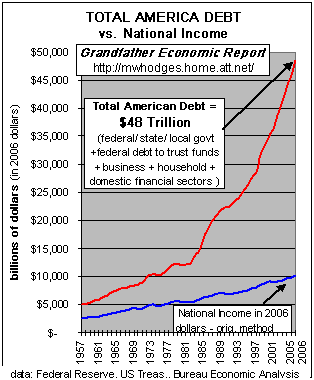 A Gradual Transition! A Gradual Transition!
Puru Saxena
8 May 2007
BIG PICTURE - A gradual transfer of wealth and power
is currently underway. Thanks to globalisation and economic reforms,
the great wealth divide between the industrialized nations and
the "emerging" economies is contracting. Over the coming
decades, I anticipate this process to accelerate. In other words,
I believe the future will bring rising consumption and a higher
standard of living in today's impoverished countries (China,
India, Brazil and other "third world" countries), whereas
we are likely to witness the reverse in the US and parts of Western
Europe.
Over the past decades, the
US has been the engine of global growth; however its dominance
will be challenged in the not too distant future. If my assessment
is correct, China will replace the US as the world's single most
important economy. Before you dismiss my claim as a far-fetched
fantasy, I want you to consider that China has the biggest population
in the world, the largest foreign exchange reserves (over US$1
trillion), a booming economy, an extremely high savings rate
and expanding surpluses. Moreover, its currency is extremely
undervalued and China (despite extremely low per-capita consumption
levels) has already surpassed the US as the biggest consumer
nation.
Sceptics who doubt China's
role in the global economy should take note of the fact that
Europe already imports more from China than it does from the
US. To top it all, the US is the largest debtor nation the world
has ever seen, its debt to GDP ratio is over 400% (Figure 1),
it has a negative personal savings rate, its currency is overvalued
and its society is heavily dependent on consuming cheap, imported
goods.
Figure 1: US - heavily in
debt!
 Source: Grandfather
Economic Report
Source: Grandfather
Economic Report
To be fair, thanks to the Federal
Reserve's expansionary monetary policies over the past 5 years,
US asset-prices have risen considerably; also known as the "wealth
effect". At the end of last year, the market capitalisation
of the US stock market rose to a record-high of US$20.6 trillion,
matching the value of household real-estate, which also rose
to a record-high at the same time. On the surface, this may seem
like brilliant news, however you must realise that this "wealth
illusion" achieved by an ocean of money and record-high
indebtedness is only a consequence of inflation. Moreover, history
shows that although asset-prices can come down rather abruptly,
debt must always be repaid. So, I remain cautious of this engineered
American "prosperity".
Today, China has become the
manufacturer to the whole world and (at least for now) it continues
to sell its merchandise in exchange for US Dollars. Now, some
people may consider this an act of stupidity given the state
of the world's reserve currency. However, in my view, by keeping
this game going, the Chinese are simply "buying time".
Quite simply, they are happy to accept payments in US Dollars
because this allows them to strengthen their economy further.
In my opinion, the Chinese are extremely smart when it comes
to business and they know only too well that they must get rid
of their huge US Dollar reserves which they have accumulated
over the recent years. In fact, this process may have already
begun. Recently, China announced that it plans to diversify between
US$200-300 billion of its foreign exchange reserves and is considering
an investment in "strategic assets crucial for its development".
This development is negative for the US Dollar and will help
underpin the prices of natural resources.
Lately, the US has accused
China of following unfair trade practices. According to the American
establishment, China is guilty of artificially suppressing its
currency; allegedly, a key factor behind its balance of trade
problem. I find this rhetoric totally absurd on three levels.
Firstly, over the past few
years, China's imports have grown immensely. Whilst it has imported
a lot of natural resources from Latin America, Africa and Asia
to feed its economy, it has not bought much from the US. This
is not because communist China has a hidden agenda against the
"land of the free", but it has everything to do with
the fact that the US is not very competitive.
Secondly, if China was not
keeping a lid on its currency and supporting the US Dollar by
investing in US Treasuries, long-term interest-rates in the US
would be significantly higher and this in turn would seriously
hurt the housing boom. Finally, if China let its currency rise
against the US Dollar as being demanded by the US establishment,
imported Chinese goods would become extremely expensive for the
average American, thereby hurting US consumption and its economy.
So, Americans should in fact be grateful to the Chinese for helping
fund their deficits and overall consumption!
As sure as night follows the
day, at some point in the future when China feels that its economy
is strong enough, it will stop accepting US Dollars in exchange
for the goods it exports to the US. When that happens, you can
be sure that the US Dollar will sink against the Chinese Yuan
and the American economy will slip into a serious recession.
This is one of the reasons why I continue to avoid US financial
assets.
Whether you like it or not,
China will provide economic leadership over the coming decades
and investors should have a position in this exciting market.
At the moment, the Chinese authorities are busy raising interest-rates
and the bank's minimum reserve requirement in order to curtail
the rampant speculation in Chinese stocks and real-estate. Despite
the tightening efforts of its authorities, the Chinese economy
continues to power ahead. In February, Chinese exports were up
a phenomenal 52% when compared to a year ago, retail sales grew
by 14.7% and industrial production surged by roughly 19%.
It is interesting to note that
Chinese money-supply and bank-credit continue to expand at roughly
17% per annum, which is positive for asset-prices. Nobody knows
if and when Chinese stocks will correct, but if we do get a meaningful
correction, I suggest that long-term investors deploy a portion
of their capital to this impressive economy.
The above
is an excerpt from Money Matters, a monthly economic publication,
which highlights extraordinary investment opportunities in all
major markets. In addition to the monthly reports, subscribers
also benefit from timely and concise "Email Updates",
which are sent out when an important development in the capital
markets warrants immediate attention. Subscribe
Today!
Puru Saxena
 Saxena Archives Saxena Archives
email: puru@purusaxena.com
website: www.purusaxena.com Puru Saxena publishes Money Matters, a monthly economic report, which highlights extraordinary investment opportunities in all major markets. In addition to the monthly report, subscribers also receive "Weekly Updates" covering the recent market action. Money Matters is available by subscription from www.purusaxena.com. Puru Saxena is the founder of Puru Saxena Wealth Management, his Hong Kong based firm which manages investment portfolios for individuals and corporate clients. He is a highly showcased investment manager and a regular guest on CNN, BBC World, CNBC, Bloomberg, NDTV and various radio programs. Copyright ©2005-2015 Puru Saxena Limited. All rights reserved.
Recent Gold/Silver/$$$ essays at 321gold:
Jan 28 This past week in gold Jack Chan 321gold
Jan 27 A Bull Era For The Miners Stewart Thomson 321gold
Jan 25 Aztec Minerals Scores Bonanza Gold at Tombstone Bob Moriarty 321gold
Jan 23 Gold Stocks: Untapped Upside For Investors Morris Hubbartt 321gold
Jan 23 Gold's China Takeover Adam Hamilton 321gold
Jan 20 Are Gold Targets Like $20,000 Realistic Stewart Thomson 321gold
|
321gold Ltd

|

 A Gradual Transition!
A Gradual Transition!
